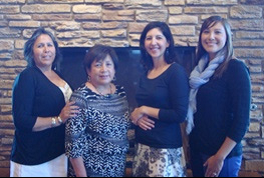LDC
LDC is proud to announce Kathy Gorospe, Chief of Government Relations and Alicia Sanasac, Employee Relations Manager have been elected President and Vice President of the New Mexico Indian Bar Association (NMIBA). The other new elected officers include; Autumn Monteau (Secretary), and Lisa Gover (Treasurer). The NMIBA has over 100 members located mostly in New Mexico but many live throughout the United States, and work closely with the New Mexico Bar Association’s Indian law section. Together they work on providing continuing legal education, social events, mentorships, and providing volunteers for pro bono events. “LDC management is encouraged to take up community service and this is our way of carrying out the LDC leadership tradition, this is an honor for both of us,” stated Kathy.

Left to Right: Lisa Gover, Kathy Gorospe, Alicia Sanasac, and Autumn Monteau
Interested in more details about the NMIBA? Both Kathy and Alicia took some time to answer questions about the New Mexico Indian Bar Association and their involvement.
What is the primary focus of the NMIBA? Kathy: The NMIBA was incorporated in 1988. The organization was established by Native American legal practitioners who practice law in Indian country with a goal of providing mentorship, training, and resources. The NMIBA was the first organization to provide this resource because very few Native Americans received jurist doctorates and practiced law within their tribal communities in 1988. NMIBA, provided fellowship and support for these attorneys who were unique practitioners in the field of law and still are. They formed a peer group which enabled them to collaborate and learn from each other in providing legal assistance to their tribal communities.
What peaked your interest in the NMIBA? How long have you been involved with NMIBA? Kathy: Throughout my career as an attorney, I have been a member of a Native American Bar Association: the Washington, D.C. American Indian Bar as well as the Federal Bar Association. I find the association helpful. I can get help with issues I’m working on, I find support in participation. I can find out what the latest issues or trends are in the practice. It’s one on those places you can go to where “everybody knows your name” and knows what you are talking about. LDC Senior Staff are also encouraged to “give back” and volunteer. I found that participating in the NMIBA was the most meaningful to me.
Alicia: I became involved in the NMIBA as a University of New Mexico law student pursuing the Indian law certificate in 2007. I see the NMIBA as an organization dedicated not just to the practice of Indian law, but dedicated to supporting native American legal practitioners who provide legal support to tribal communities (tribal members, tribal governments, tribal businesses, etc.). This area of law can be complicated when considering tribal, state and federal relationships and the impact that advocating for legal position can have on a tribal community. Being able to collaborate with other attorneys having lived and worked in Indian country and/or a specific tribal community is a great resource.
Are positions in the association elected or volunteered? How long are the terms? What are your primary responsibilities? Kathy: I was elected to serve as President. It is a one-year term. The primary responsibilities are to act as the Chief Executive Officer, preside at all the NMIBA meetings, and execute and deliver documents in the name of the NMIBA.
Alicia: I was elected to serve as Vice President. It is a one-year term. The primary responsibilities are to act as the Chief Executive Officer in the absence of the President, preside at all the NMIBA meetings, and execute and deliver documents in the name of the NMIBA.
Is the NMIBA working on a current project or event? Kathy: The NMIBA is working to revise its articles of incorporation, mission, vision, and bylaws. It is working to co-sponsor continuing legal education courses with other Bar associations, training for tribal systems, and enhancing mentorship with the UNM Native American Legal Association.
Alicia: The NMIBA is also preparing to cosponsor event(s) at the annual Federal Indian Law Conference to be held in April. On November 7, the NMIBA members will launch an important experiential program for Native American law students. Members will provide a “day in the life” experience to law students so they can get a feel for what it is like to practice law in Indian country. Students will be able to see what it is like to be corporate counsel for a tribally owned corporation, a tribal court judge, an in-house lawyer for a tribal government, or being a staff attorney in a law firm. There will be many different experiences for these law students which will help them evaluate what they would like to do when they graduate and begin the practice of law.
What is the NMIBA passionate about? Alicia: The NMIBA is passionate about providing training and resources to legal practitioners in Indian country and providing good service to tribal communities. Tribal communities have spent years educating their members so that they can be of service to the community after their educations are complete. For NMIBA members, the time for giving back has come and NMIBA is seeking many ways to give back.
Do you have a specific goal you would like to accomplish through your position at the NMIBA? Kathy: I would like the NMIBA to be a resource to tribal communities to help them build stronger and better governmental and legal systems.
How could someone with an interest in the NMIBA get involved?
Contact Kathy Gorospe at kgorospe@POLDC.com or Alicia Sanasac at asanasac@poldc.com.
